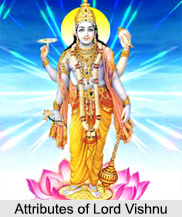 Attributes of Lord Vishnu, who is held to be the personal God of Religion, in Vaishnava theology, are such that He is essentially free from imperfections and possesses infinite auspicious attributes of unsurpassable excellence.God, as a spiritual entity, should, therefore, possess certain attributes. Any sound theological system which believes in the existence of God should necessarily admit attributes in respect of the Divine Being. In Vaishnavism, the Alvars and the Vaishnava acharyas particularly Ramanuja, have dealt with extensively the various attributes of God. In a broad sense, the hymns of the Alvars are a descriptive narration of the Bhagavad gunas, the glorious qualities of God.
Attributes of Lord Vishnu, who is held to be the personal God of Religion, in Vaishnava theology, are such that He is essentially free from imperfections and possesses infinite auspicious attributes of unsurpassable excellence.God, as a spiritual entity, should, therefore, possess certain attributes. Any sound theological system which believes in the existence of God should necessarily admit attributes in respect of the Divine Being. In Vaishnavism, the Alvars and the Vaishnava acharyas particularly Ramanuja, have dealt with extensively the various attributes of God. In a broad sense, the hymns of the Alvars are a descriptive narration of the Bhagavad gunas, the glorious qualities of God.
Concept of Swarupa and Dharma
While discussing the attributes, the Visistadvaita epistemology makes a distinction between the essential attributes and the secondary qualities. The essential attributes are those which are unique to a particular object and which constitute its distinguishing characteristics. The nature of an object (Swarupa) is determined only in terms of such attributes. Dharma stands for the distinguishing characteristic of an object. The latter type of qualities is, therefore, technically called as "Nirupita-Swarupa-Visesana", i.e., qualities which become known after Swarupa of the object is comprehended. The essential attributes are called "Swarupa Nirupaka Dharma", i.e., the attributes which determine or define the essential nature of an object.
Six Principal Attributes of Lord Vishnu
The Pancharatra Samhitas and the Vishnu Purana uphold six attributes (Sadgunas) as the most important because these portray the Supremacy of Bhagavan, another name for Brahman. These six attributes are briefly discussed below:
1. Jnana: The term Jnana means omniscience or the capacity to know everything at the same time. Nathamuni explains the term as the capability of having direct vision of everything. Unlike our perceptual knowledge, the perception of Ishwar is not dependent on the mind and sense organs. His knowledge is also not subject to contraction and expansion. It is in this sense that God is described in the Mundaka Upanishad as sarvavit (omniscient).
2. Shakti: The general meaning of the term Shakti is power. When it is regarded as an attribute of God, it is understood in the sense of omnipotence. A God, who is admitted as the creator of the universe, should have the super power to bring forth such a variegated universe.
3. Bala: The word Bala means strength. It is an important attribute of God because He should be able to hold all the created entities such as the heaven, planets, the physical universe etc., in their respective positions. It is in this sense that the Brhadaranyaka Upanishad says that Brahman is the causeway that serves as the supporter to keep apart the different worlds. The same truth is reiterated by the Bhagavad Gita and Vishnu Purana.
4. Aishwarya: Aishwarya means lordship. It signifies the quality of controllership of the entire universe by His unchecked freedom. This is a significant attribute because by virtue of this quality God becomes the Supreme Lord. By virtue of the possession of this attribute, Vishnu is designated as "Sarvesvarah" in the Vishnu Sahasranama.
5. Virya: Virya means energy. As an attribute of God, it signifies the special quality by means of which the Supreme Being remains unaffected by changes in spite of His being the material cause of the universe. Vishnu is, therefore, described as "Avikara" or the one who is not subject to any kind of modification, thereby asserting His transcendental character.
6.Tejas: The meaning of Tejas is splendour. As an attribute of God, it signifies the power of self-sufficiency. It is defined as the power which is not in need of any external aids. It is a special power of God by means of which He is able to create the universe without the aid of any other accessories.
Secondary Attributes of Lord Vishnu
The secondary attributes of God, known as "Nirupita Swarupa Visesana" are infinite in number. Vedanta Desika points out that these are all included in the six principal attributes. Just as the whole universe is contained within the body of Ishwar, in the same way all other qualities are contained in the six. All these are different aspects of the six qualities. They become manifest as and when the need arises to exhibit them (dgantava), whereas the principal six qualities are ever present.
Divine Body of Ishwar
God and His Divine body have been variously defined in the different religious and ancient texts. The hymn of the Rig Veda speaks of the Lord as having His eyes in all places, His faces in all directions, His arms in all directions and His feet in all directions. The God of Vaishnavism is not only a Divine Being endowed with numerous attributes par excellence but He possesses an eternal, spiritual divine body.









